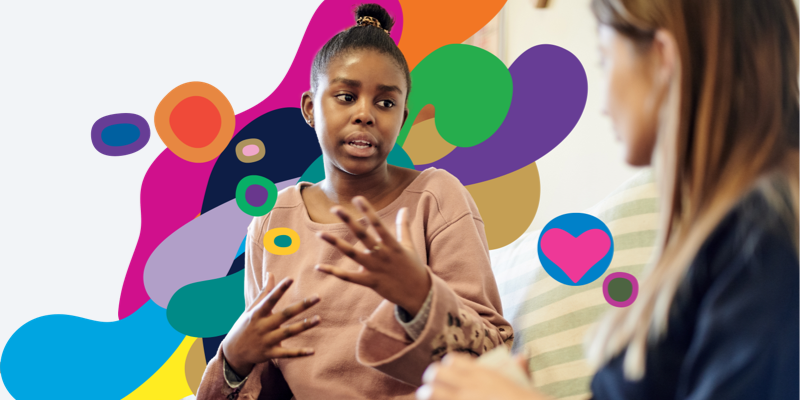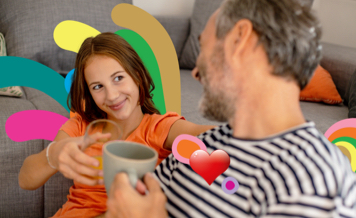Anxiety: Signs, causes and treatments
You may get a little anxious at certain points in your life. But when it interferes with your everyday life, help and support is available.
Jump to section: Signs and symptoms | Causes | Treatment | Lifestyle changes | Where to get help
What is anxiety?
A national study of mental health and wellbeing (2020–22) found that more than one in six Australians (17.2 per cent) had experienced a form of anxiety in the previous 12 months.1
Anxiety may appear when you are worried or nervous about something. Anxiety may be triggered by a work presentation, an exam or a situation that left you rattled. It’s okay to feel a little anxious. In fact, anxiety is your body’s natural response to stress, which can help you avoid dangerous situations or motivate you to solve a problem.
Anxiety should be a feeling that comes and goes, and it becomes an issue when it hangs around longer than usual. If you develop an anxiety condition, the feeling can stick with you all the time and it can become so intense that it interferes with your life.

Anxiety in children
Discover the different types of anxiety in children, learn how to implement coping strategies and what to do if their worries begin to creep into school life.

Anxiety in teenagers
What's the difference between normal teenage worries and what may be anxiety? Learn how to spot the signs of anxiety in a teenager and where to get support.

Anxiety and depression in older adults
The symptoms of anxiety and depression in older adults can often be hard to recognise. Learn more about the signs and symptoms in older adults.
Signs and symptoms of an anxiety condition
Everyone experiences anxiety differently, but it can be hard to recognise when it becomes an issue. According to Beyond Blue, normal anxiety tends to be limited in time and connected to a stressful situation or event. The type of anxiety experienced by people with a condition is more frequent or persistent and isn’t always connected to an obvious challenge.
Because anxiety is different for everyone, there is no ‘one size fits all’ when it comes to symptoms but here are some common examples:
Physical
Panic attacks, hot and cold flushes, racing heart, a tight feeling in the chest, quick breathing, restlessness, or feeling tense, wound up or edgy.
Psychological
Excessive fear, worry, catastrophizing, or obsessive thinking.
Behavioural
Avoidance of situations that make you feel anxious which can impact on study, work or social life.
Beyond Blue has an online K10 screening test for anxiety and depression that you can use to help you understand what kind of support you might need right now.


The causes of anxiety
Your brain is complex, which means that anxiety can appear in different ways. There are multiple factors that contribute to anxiety.
Ongoing stressful events
These can include workplace stress, a change in living arrangements, family or relationship issues, pregnancy and giving birth, traumatic events or the death of a loved one.
Personality factors
People with certain personality factors during childhood, such as perfectionism, being easily flustered and low self-esteem, may sometimes develop anxiety.
Physical health
Chronic physical illness can also contribute to anxiety conditions, with common conditions including diabetes, asthma, hypertension and heart disease associated with anxiety.
Family members
A family history of anxiety or other mental health conditions may contribute to an individual developing anxiety conditions.
Other mental health conditions
There are different types of anxiety and while some people may experience one condition on its own, others may experience multiple conditions, or other mental health conditions such as depression at the same time.
Treatment for anxiety
Common treatments for anxiety include talking therapy, such as cognitive behaviour therapy (CBT) with a mental health professional, and medication, such as antidepressants. Often, a combination of treatments is appropriate.
A good place to start is talking to your GP. They will be able to assess your situation and recommend the best next steps for your treatment, including recommending a professional if that’s what you need.
It’s important to remember that everyone’s situation is unique, and treatment can look different from person to person.

Managing anxiety with lifestyle changes
Your health professional may also suggest ways you can manage your symptoms yourself with lifestyle changes. Here are five tips from Dr Andrew Wilson, Medibank’s Chief Medical Officer.
Make time for sleep
Sleep is essential for your overall health, and it plays a key role in managing anxiety. It helps regulate hormones that influence your stress response and emotional resilience. When you don’t get enough sleep, it can make anxiety symptoms worse and reduce your ability to cope.
Move your body
Exercise, especially aerobic activity, supports both physical and mental wellbeing. When you move your body, it releases hormones that can help reduce anxiety. Even something as simple as a brisk 30-minute walk can make a meaningful difference.
Eat a balanced diet
Eating a nutrient-rich diet can positively impact your energy levels and mood. A poor diet, on the other hand, can leave you feeling sluggish or low, which may make anxiety harder to manage. Healthy food choices benefit both your body and your mind.
Connect with others
Talking to family and friends about how you’re feeling can lighten the mental load. Bottling things up can increase stress, while strong relationships can boost your sense of wellbeing. People with healthy social connections are generally happier and more resilient.
Try meditation or relaxation techniques
Anxiety often involves worrying thoughts or fear about the future. Meditation helps bring your focus back to the present moment and may reduce negative thinking patterns.
For more expert tips from Dr Andrew Wilson, read the full article here.

24/7 Medibank Mental Health Support
Medibank health insurance members can chat to a mental health professional about how they feel and ask questions about a range of mental health concerns for themselves or a loved one and get guidance on what they can do next. Chat online or call 1800 644 325 anytime of the day or night, 7 days a week at no extra cost.~
Where to get help
If your life or someone else’s is in danger, call 000 immediately.
If you’re in distress and need help, call Lifeline on 13 11 14 for 24/7 crisis support.
For non-emergency support, your GP or regular health practitioner is often the best place to start. They will be able to assess your individual situation and recommend the best next steps for your recovery.
Medibank health insurance members can chat to a mental health professional about how they feel and ask questions about a range of mental health concerns for themselves or a loved one and get guidance on what they can do next. Chat online or call 1800 644 325 anytime of the day or night, 7 days a week at no extra cost.*
Remember that help is always available, no matter the situation.
How can we help?
I want to know how my cover supports mental health
I need help and want to talk
Related articles
Things you need to know
1. National Study of Mental Health and Wellbeing, 2020-2022 | Australian Bureau of Statistics, October, 2023
* Some referred services may involve out of pocket costs and waiting periods may apply.
While we hope you find this information helpful, please note that it is general in nature. It is not health advice, and is not tailored to meet your individual health needs. You should always consult a trusted health professional before making decisions about your health care. While we have prepared the information carefully, we can’t guarantee that it is accurate, complete or up-to-date. And while we may mention goods or services provided by others, we aren’t specifically endorsing them and can’t accept responsibility for them. For these reasons we are unable to accept responsibility for any loss that may be sustained from acting on this information (subject to applicable consumer guarantees).








